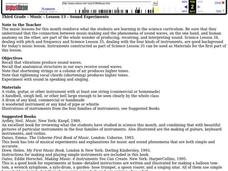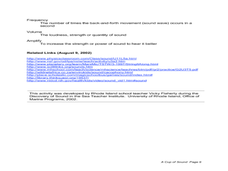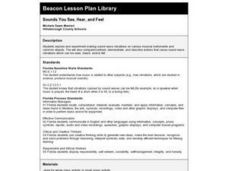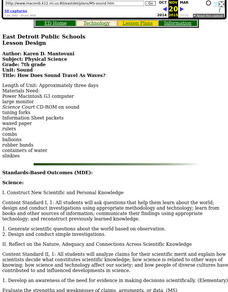Curated OER
Hearing or Sound?
In this hearing worksheet, students complete a graphic organizer by filling in the steps between matter vibrating and hearing the sound.
Curated OER
How We Hear
Students study how sounds are transmitted from the environment to the brain. In this investigative lesson students participate in activities that show them how we hear, what sound waves are and the difference in seeing and feeling...
Curated OER
Sound Energy
Sixth graders understand properties and behavior of heat, light, and sound. They describe the production of sound in terms of vibration of objects that create vibrations in other materials. Students describe how sound is made from...
Curated OER
Sound
In this sound worksheet, students understand how sound is created and how the human ear "hears." Kids compare the frequency, amplitude, and speed of sound. Then students complete 10 matching, 7 fill in the blank, and 11 short answer...
Curated OER
Seismic Waves
In this seismic waves activity, student will read information about the different types of waves that occur during an earthquake: P (Primary) waves, S (Secondary) waves, and shear waves. Then students will complete 2 short answer questions.
Curated OER
Vibrations
Students explore how vibrations create sound by strumming a rubber band. They feel the vibration of their own vocal chords. Then they explore the motion of sound waves and echoes. They rely on their own hearing to locate others in their...
Purdue University
Design of Music Instruments for a Rock Band
Can you create a rock band? Scholars learn about the creation and transmission of sound in a hands-on STEM activity. First, they explore the transmission of sound using a tuning fork. Then, they must solve the problem of missing...
Curated OER
Music
Third graders study sound waves and vibrations. They sing a silly round in three parts.
Curated OER
Sounds Good To Me - Instrument Creation
Third graders differentiate between pitch and volume and explain how sound travels through different materials. They analyze sound waves for their basic characteristics. Students design an instrument based on the principles of sound...
Curated OER
When It Comes to Sound, I'm All Ears!
Students discover how sound is produced and how sound travels. Through inquiry, problem solving and hands-on activities, students explore high and low sounds and the mediums in which sound travels best.
Curated OER
Sound
Young scholars identify and explain these vocabulary words: vibration, volume, pitch, particles, tuning forks, waves and matter. They explain that sound travels through gas, liquid and solid. They be
Curated OER
Sound and Hearing
Students explore how sound travels. In this sound lesson plan, students complete seven activities where they observe the different characteristics of sound. Students make sound, watch sound happen, and learn about the ear. Students gain...
Curated OER
Standing Waves
In this standing waves worksheet, students read about standing waves, their nodes, their anti-nodes and their wavelengths. They are given diagrams of harmonics and the equation to find the frequency of harmonics. Students match terms...
Curated OER
The Senses
In this senses worksheet, students describe the difference in sounds heard with a spoon. Then they describe how each object creates a sound and why. Students also explain the process of sound moving through the outer and inner ear.
Curated OER
A Cup of Sound
Students study sound and how it is created. In this sound waves lesson students complete a lab activity that shows students the variables that affect sound.
Curated OER
Sounds Like Science - Guitars
Students discover that all movement produces sound waves but not all sounds can be heard with the human ear. They experiment with a variety of substances to see which are audible and which are inaudible.
Curated OER
Sounds You See, Hear, and Feel
Students explore and create sound wave vibrations using musical instruments and common objects. They compare/contrast and describe actions that cause sound wave vibrations that can be seen, heard, and felt.
Smithsonian Institution
What's the Code? Coding Robot Movements Using Sound
Tap into the desire to learn about computer codes. Pupils apply the Tap Code and the Polybius Square to send secret codes using sound. They design a code that tells a robot what movements to make and then test out their code using one of...
Tinybop
The Human Body
Examine the systems of the human body with a bold, charming, and kid-friendly application. This noteworthy tool is certain to get kids interested what goes on inside of them! The eye feature uses the tablet camera to view images and show...
Curated OER
Sound Waves; vocabulary review
In this science worksheet, students locate 28 words in a word search. The focus of the word search is vocabulary connected to the study of sound waves.
Curated OER
How Does Sound Travel As Waves?
Seventh graders participate in a number of activities designed to increase their understanding of how sound is generated and how it travels.
DiscoverE
Slinky® Science
Toys are great for learning about physics. Scholars use Slinky® toys to study Newton's laws of motion and types of energy. After a little play, they then model longitudinal and transverse waves with the Slinky® toys.
PBS
Math with Jake: Frequencies and Pitch
Be an octave above the rest. A musician explains how to write music in different time signatures. An interesting resource continues to demonstrate ratios using the pitch of musical notes and hertz. Pupils use a pitch table and determine...
Curated OER
Sounds Good to Me
Students determine density and hardness of wood samples based on several investigations. In this physical science and music lesson, students visit four centers and perform tests on wood samples to determine densities and hardnesses. They...

























